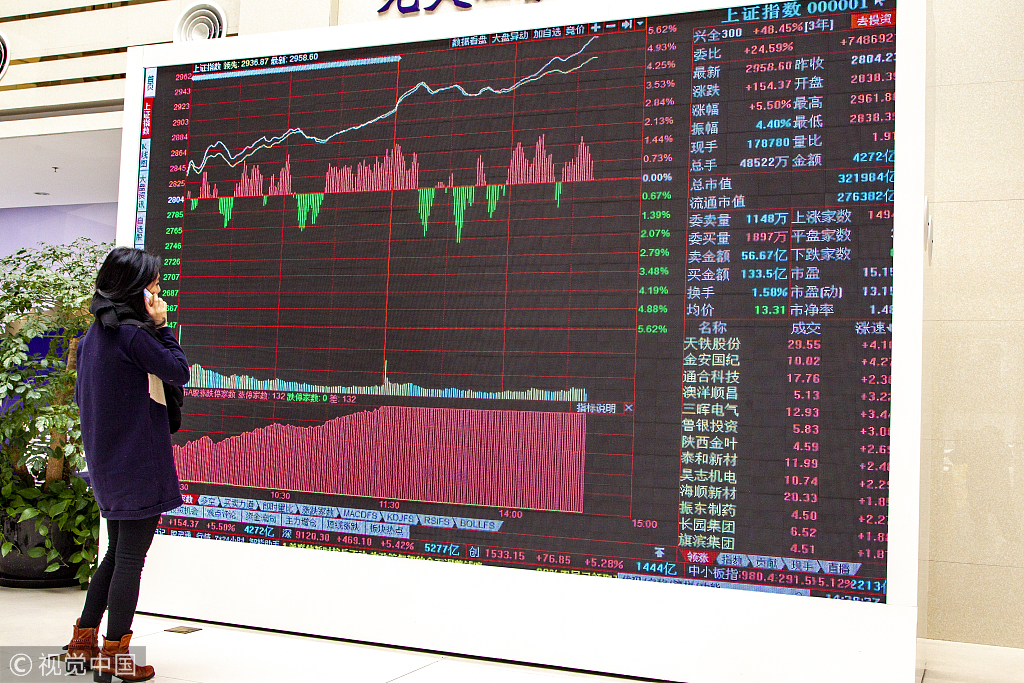
China's A-share market is becoming more attractive to overseas investors as the country maintains a steady pace of economic growth and capital market opening-up amid a precarious global recovery, experts said.
When the market opens next Monday, two major investment index compilers, FTSE Russell and S&P Dow Jones Indices, will implement their latest A-share inclusion steps. The former will roughly triple the weighting of A-share constituents, while the latter will add more than 1,000 A shares to its global benchmarks, after their competitor MSCI Inc raised A-share weighting in August.
Founder Securities estimated the moves will trigger about $30 billion to $40 billion in foreign inflows into A shares.
Huang Jun, chief Chinese analyst at currency trading platform forex.com, said the three major global equity index providers' successive inclusion moves demonstrated the increasing allure of Ashare assets to global investors.
China's economic growth has slowed in the past two years but still showed "clear advantage" compared with other emerging markets and advanced economies, Huang said.
In the first half of this year, the world's second-largest economy expanded by 6.3 percent. The figure slowed from 6.6 percent for the whole of 2018, but was the highest among all major economies worldwide, official data said.
"(The economic situation of) China has been stable with solid development foundation, which is the biggest reason why global capital favors the country," Huang said, citing the dampening effect of Brexit on the eurozone and emerging market debt issues such as those in Argentina and Turkey on global investors' confidence in these economies.
Besides China's growth prospects, investment opportunities in A shares also derive from the potential enhancement in valuation, said Lynda Zhou, equities chief investment officer in China at Fidelity International.
"With deepening reform of China's asset management sector, onshore risk-free interest rates are expected to decline sustainably, pushing up the valuation levels of equity assets," Zhou said.
Meanwhile, as the market's investor structure, which is dominated by retail investors, may make short-term stock price performance deviate from the true value of listed firms, long-term investment opportunities abound, she said.
"We believe the valuation levels and growth prospects of A-share listed firms still have an advantage (over global peers)," Zhou said, adding that she pays particular attention to investment opportunities related to consumption upgrading, high-end manufacturing and independent technologies.
The A-share market regained upward momentum after the benchmark Shanghai Composite Index hit an intraday low of 2733.92 points in early August, the lowest since mid-February. The SCI went up by 0.25 percent to close at 2985.66 points on Wednesday.
Foreign inflows accelerated along with the recovery, with net inflows via northbound trading of stock connect programs between mainland and Hong Kong bourses standing at 28 billion yuan ($3.95 billion) during the first trading week of September, the highest since the first week of November last year.
By the end of the first half of this year, foreign capital accounted for 7.6 percent of the A-share market's free float capitalization, up from no more than 3 percent at the beginning of 2016, data collected by Fidelity International showed.
"Global investors have been structurally underweight in China for many years," said Michael Orzano, senior director of global equity indices at S&P Dow Jones Indices.
But this situation has been gradually changing as investors' exposure to the A-share market rose after the market became more accessible and gained inclusion in global equity benchmarks, Orzano said.
China has made steady progress in opening up the A-share market in recent years. The authorities quadrupled daily transaction limits for stock connects last year, and continuously relaxed regulation of qualified foreign institutional investor schemes, including announcing an end to quota limits of the schemes last week.
